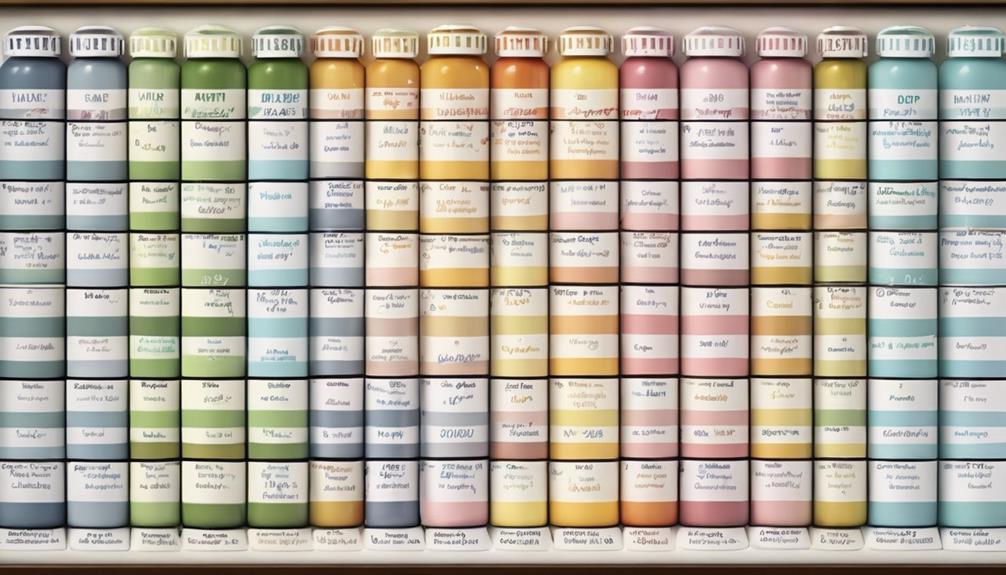In the world of taking care of babies, the saying ‘prevention is better than cure’ remains relevant. When it comes to important tips for formula feeding, implementing specific key steps can significantly improve the well-being of your newborn.
From selecting the right formula to mastering proper feeding techniques, these tips are essential for a healthy start. Let's explore the nuances of formula feeding that can set the stage for your newborn's growth and development.
Key Takeaways
- Choose iron-fortified formulas for growth support.
- Feed every 2-3 hours, adjusting amounts as needed.
- Maintain hygiene by washing hands and sterilizing bottles.
- Monitor feeding patterns and seek pediatric advice for adjustments.
Formula Selection
When selecting a formula for your newborn, it's important to contemplate their individual needs and consult with your pediatrician to guarantee it meets their nutritional requirements. Babies thrive on iron-fortified formulas that support their growth and development. These formulas provide essential nutrients important for your baby's overall health. You can choose between milk-based, soy-based, or specialty formulas depending on your baby's health and dietary preferences. Milk-based formulas are commonly recommended, but if your baby has allergies or lactose intolerance, soy-based or specialty formulas might be suitable alternatives.
Additionally, formulas enriched with DHA and ARA play a significant role in your newborn's brain and eye development. These fatty acids are crucial for cognitive and visual function, making them important components in your baby's formula. Always remember to discuss any special requirements or concerns with your pediatrician to make sure that you select the most appropriate formula for your little one's needs.
Proper Feeding Techniques

To guarantee ideal nourishment for your newborn, mastering proper feeding techniques is fundamental in their early development. When preparing formula, make precise measurements to maintain a nutritional balance in each bottle. It's recommended to start with 1-3 oz per feeding, adjusting based on your baby's hunger cues and age.
Room temperature bottles are safe for feeding, but any prepared formula should be refrigerated within 2 hours to prevent contamination. Following CDC guidelines for formula mixing is vital to guarantee safety and proper nutrition.
Consulting with your pediatrician for recommendations on formula selection and feeding techniques can provide valuable guidance. By adhering to these practices, you can support your newborn's healthy growth and development while preventing potential issues related to improper formula preparation and feeding.
Hygiene Practices
Maintaining proper hygiene practices is essential for ensuring the health and safety of your newborn during formula feeding. Before preparing bottles, it's necessary to wash hands thoroughly to prevent contamination.
Sterilizing bottles, nipples, caps, and rings before the first use is vital to maintain hygiene standards. Using clean and sanitized equipment helps reduce the risk of bacterial growth and ensures your newborn's safety.
Remember to discard any leftover formula after feeding to prevent bacterial contamination. Additionally, it's essential to clean and sanitize bottles before each use to protect your newborn from harmful bacteria.
Feeding Schedule

Ensuring a consistent feeding schedule is key to meeting the nutritional needs of newborns and establishing a healthy routine for their growth and development. Newborns typically feed every 2-3 hours, amounting to 8-12 feedings per day.
It's important to pay attention to hunger cues such as rooting, sucking on hands, or crying to feed the baby promptly. Feeding on demand is recommended for both breastfed and formula-fed newborns to ensure they receive adequate nutrition and establish a good feeding routine.
While breastfed babies may nurse for 10-45 minutes per feeding session, formula-fed infants may finish a bottle in about 15-20 minutes. If a newborn appears sleepy and it has been more than 3 hours since their last feeding, it's vital to wake them up for feeding to promote adequate nutrition and healthy growth.
Troubleshooting Common Issues
When troubleshooting common issues with formula feeding newborns, addressing frequent spitting up can be managed by adjusting feeding practices and consulting with a healthcare provider if needed.
To help reduce spitting up, try burping your baby more frequently during feedings and keeping them upright afterwards to minimize reflux. Avoid tight clothing around the abdomen, as this can exacerbate spitting up problems.
If your baby is experiencing excessive spitting up, seeking guidance from a healthcare provider is crucial to rule out any underlying medical conditions. Consider offering smaller and more frequent feedings to prevent your baby from consuming too much formula at once, which can lead to increased spitting up.
Monitoring your baby's feeding patterns and adjusting feeding positions can also aid in alleviating spitting up issues during formula feeding.
Frequently Asked Questions
What Is the Routine for a Formula Fed Newborn?
We feed our formula-fed newborn every 2-3 hours, aiming for 8-12 feedings daily. Each feeding is about 1-3 ounces. Establishing a routine guarantees consistent intake, promoting healthy growth. Burping after feeds prevents discomfort. Monitoring feeding times and reactions helps track our baby's health.
What 4 Tips Are Recommended for Bottle Fed Babies?
We recommend ensuring bottles are clean before each use, warming them in warm water, feeding 1-3 oz per meal, and storing prepared formula in the fridge for up to 24 hours. These tips promote safe and healthy feeding for newborns.
How Much Formula Should a Newborn Have per Feeding?
We typically aim for 1-3 ounces of formula per feeding in the early days, gradually increasing to 2-4 ounces. Signs of fullness include mouth closure or turning away. Feeding on demand every 2-3 hours aligns with newborn nutritional needs.
What Is Required for Formula Feeding?
For formula feeding, we need baby formula, clean bottles, nipples, caps, and rings. Sterilizing equipment before first use is essential. Accurate measurement of water and formula is vital. Warm water may be needed. Proper disposal of leftover formula is recommended.
Conclusion
In summary, following these essential formula feeding tips for newborns is vital for their health and development.
Just like a well-oiled machine, proper formula selection, feeding techniques, hygiene practices, and feeding schedule work together to guarantee your baby thrives.
Remember, always consult with your pediatrician for guidance and support along the way.
With these tips in mind, you can navigate the world of formula feeding with confidence and ease.










